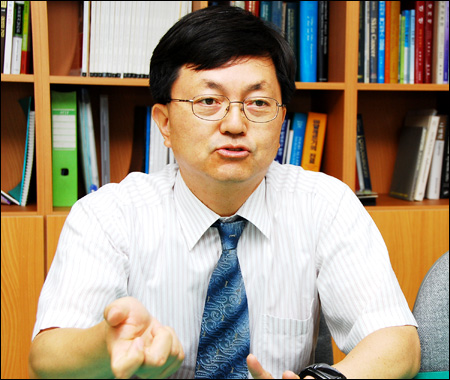 It is getting colder― signs of a change of season. The mercury is dropping and humidity is changing, too.
It is getting colder― signs of a change of season. The mercury is dropping and humidity is changing, too.
Each turning point of a season brings tough and tearful days to atopic dermatitus sufferers. Some scratch their skin raw while others find their skin haggard and reddish all over.
These types of skin disease― in European countries they call it eczema― is seen on about 15 percent of new born babies, according to Prof. Kim Kyu-han of Seoul National University Hospital. There isn't an exact figure yet, but the number is growing every year. Also, adults and adolescents find such symptoms too, so the actual number of people suffering from this skin disorder is larger, he says.
The causes of eczema are still unknown, but many experts assume an immune system that leans towards being extra sensitive to allergens could be one of them. Some genetic factors, as well as pollution could produce acute symptoms, too, he says.
Kim also suggested that nowadays people living in too hygienic an environment has weakened the immune system, assisting allergens. ``In the past, we could get over germs or other unhygienic factors because we were used to live it. However, these days mothers want to provide their children with the cleanest and freshest environment, but as a result, their children cannot tolerate allergen stimulation,'' he said.
Studies in eczema had not been active enough since the 1980s when international academia first set some standards to diagnose such diseases. In Korea, such criteria were specified in 2006.
The main symptom of such disease is ``itchiness.'' For children under two years old, whether they feel itchy around the face and torso is a main criteria.
Those who have xerosis, another such skin complaint, suffer from darkness around the eyes, eczema around the eyes, ears, and nipples, and inflammation around the lips. Other atopic skin disease sufferers have problems with their hands, feet, or pores.
Kim says these days people became nearly ``phobic`` to atopic disorder including atopic rhinitis and asthma in that they tend to overreact to little symptoms they see. ``In most cases, they are not atopic disease but simply seborrheic dermatitis,`` he says.
He is far from enthusiastic about recent reports that eating meat or using adhesives in the construction of housing as being the main causes of such diseases. ``I doubt that could directly involve atopic dermatitis,`` he says.
He also criticizes people's being against using steroids in dealing with itchiness. ``Using a very small amount of steroid ― authorized by the doctor ― wouldn't do any harm. Trying to bear the pain ― when it is too itchy, and hurts ― could add stress and worsen the symptoms,'' he says.
So-called alternative medicines wouldn't work either, he says. ``I have learnt that there are so many so-called medicines alleging they can heal the disease, but since we do not know the cause, we do not know how to deal with it properly. We can only control the level of symptoms with medication or other methods'' he says.
``Buying some hand cream to add moisture to the skin is okay but do not get lured by something dramatic,`` he adds.
Kim says that Korea and other parts of the world all share similar levels in treatment and research. He says in the future, the treatment will be more of a tailor-made style, focusing on individual patients' characteristics.
``Once we figure out and confirm the link between genetic factors and the allergen, doctors will be able to offer each patient different treatment based on their genes, and background, etc. In severe cases we could control the symptoms by controlling the genes,'' he says.
Kim is now working on collecting data of atopic dermatitis patients in the nation, starting with Seoul, in collaboration with the city government.
``Once the data is analyzed, then basic atopic skin disease treatment and education on it could be done at schools,'' he says.
Kim, an expert in the field, sees about 20,000 patients a year. Among them, 10,000 have atopic skin disease. He has a reputation of being patient and making patients and family members feel better informed.
Graduating from Seoul National University, he was a board member of the Korean Academy of Asthma, Allergy and Clinical Immunology and is an executive at the Korean Dermatological Association. He is the author of numerous reports and several world-renowned papers.
August 26, 2008
Korea Times
Research Research Highlights
Research Highlights
Research Highlights
Research Highlights

